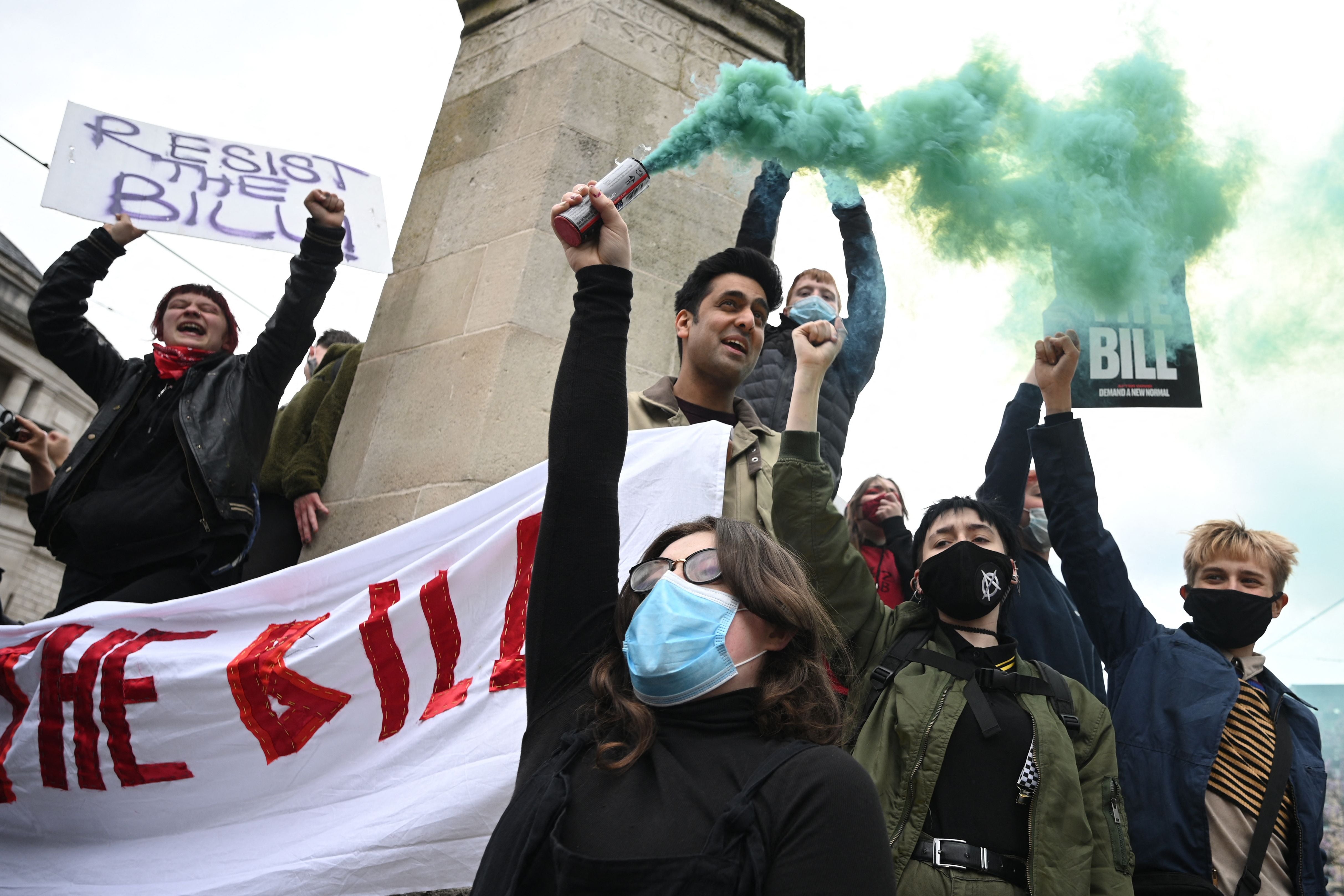Policing bill will unjustly criminalise and imprison women for crimes they did not commit, experts say
‘The measures will impact women in coercive relationships or women who are in the wrong place at the wrong time,’ campaigner tells Maya Oppenheim


Women will be unjustly criminalised and even imprisoned for crimes they did not commit because of a controversial policing bill that will “widen the net” of who gets targeted by police, experts have warned.
Under the new legislation, women will face up to two years in jail for not informing the police that someone they know is carrying a weapon – even if they may be unaware that the person is doing so.
Campaigners have said the so-called “ought to have known” proposals – which could lead to the issuing of “serious violence reduction orders” (SVROs) for those who were not in posession of a weapon themselves – will worsen racial inequalities, with black and minoritised women hit hardest due to their already being twice as likely to be arrested as white women.
Leigh Morgan, senior legal officer at Rights of Women, a leading legal rights charity for women, told The Independent: “The proposal would place people at risk, including marginalised and potentially abused women, as culpable by association and being targeted for discriminatory and intrusive stop-and-search measures.
“These proposals will strengthen and intensify the discrimination faced on a day-to-day basis of women and girls belonging to communities that are marginalised.”
Maithreyi Rajeshkumar, of Agenda, a charity that campaigns for women and girls at risk, told The Independent: “The measures will impact women in coercive relationships or women who are in the wrong place at the wrong time.”
She argued that the proposal “renders the impact of coercion in relationships invisible” – adding that many women who are swept into the UK’s criminal justice system have experienced coercion by partners, family members or friends.
Ms Rajeshkumar said: “We know women are often brought into the criminal justice system because of relationships, and not wanting to speak to anyone due to possibly being scared.
“They might have complex relationships with people they love, who they may have kids with or they are in abusive relationships with.
“We should not be punishing a woman for harm she has had because of an abusive or violent relationship or her place in the community. The measures widen the net of who gets caught up in the criminal justice system.”
Razia, a 23-year-old woman who is a domestic abuse survivor, said she was drawn into the criminal justice system when her ex-partner was arrested for drugs offences.
She added: “I was in a coercive and abusive relationship, and it was the wrong place, wrong time. Because I turned a blind eye to it, I was still sort of involved inadvertently because I was in contact with him and because he’d been making phone calls from my phone.
“When I got to court, my ex-partner and all his friends were there. They were looking at me, making snide comments – saying: ‘If you say something, it’s game over for you.’”
Ms Rajeshkumar noted that black women and girls are disproportionately affected by policies on crime and justice as a result of racism.
“Black and minoritised women – either themselves or within their communities – have historically been stigmatised and criminalised for the survival mechanisms and coping strategies they have to take,” she added. “Often the system ends up re-traumatising them.”
The policing bill, which has passed all stages in the House of Commons without significant amendment, is currently being debated in the Lords before being signed into law.
Dr Kate Paradine, chief executive of Women in Prison, warned that the new measures could “deepen” racial inequality as she noted that many women who come into contact with the criminal justice system have “histories of violence, abuse and exploitation”.
“It also utterly undermines the government’s strategy to see fewer women sent to prison, when increasingly more girls and young women are being targeted for criminal exploitation and coercion,” she said.
Frontline service providers have previously warned that women in prison are often the victims of more serious offences than those for which they have been convicted. A previous report by the Prison Reform Trust found that 80 per cent of women in jail were there for non-violent offences.
Baljit Banga, executive director of Imkaan, an umbrella organisation dedicated to addressing violence against black and minority ethnic women, branded the new measures “a harmful, misguided and racialised addition to an already racist police and crime bill.”
She added: “Criminal exploitation by male perpetrators, and the use of threats to involve women and young women in criminal activities, is an increasing form of violence.
“Black women are seven times less likely to receive appropriate intervention or support when they are abused. Black and minoritised women and young women face the constant threat of being ‘reported to’ police and the authorities as a means of abuse and control by perpetrators.”
The government’s highly controversial new bill has been widely criticised for rolling back human rights.
Critics argue that the wide-ranging bill includes a vast range of oppressive powers, including cracking down on citizens’ right to protest as well as compounding the problems of over-policing and the criminalisation of marginalised communities.
Campaigners argue that SVROs are similar to joint enterprise laws, which have swept women into the criminal justice system despite them not being involved in the alleged offence.
At the end of last year, The Independent reported that joint enterprise laws were leading to women being jailed for life for violent crimes they did not commit. A first-of-its-kind study, carried out by Manchester Metropolitan University, unearthed new evidence revealing that at least 109 women had been sentenced to long prison sentences, including life sentences, under the joint enterprise system.
A 2016 Supreme Court ruling found that the law had “taken a wrong turn” when it came to joint enterprise, but the legal principle, which first emerged in the Victorian era, continues to be used. It effectively enables numerous people to be convicted for one offence.
The Home Office has been contacted for comment.





Join our commenting forum
Join thought-provoking conversations, follow other Independent readers and see their replies
0Comments